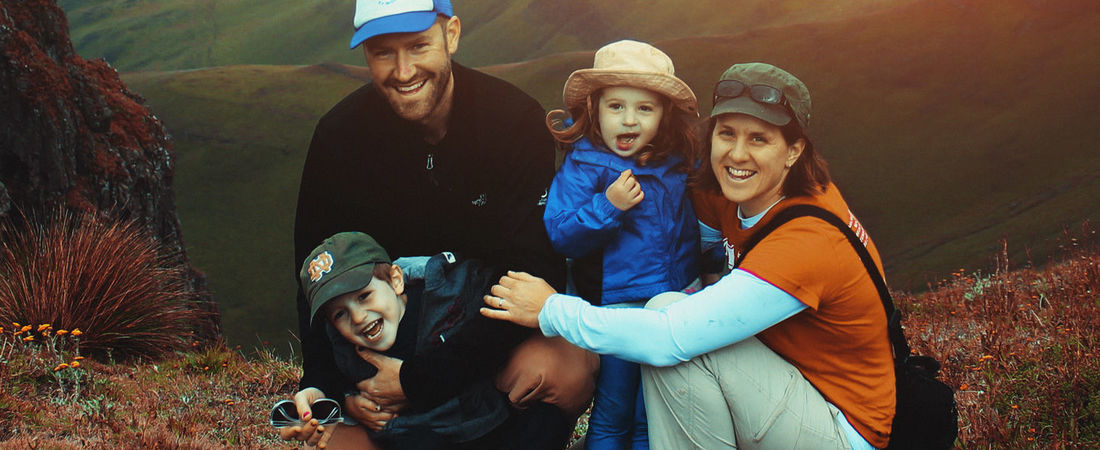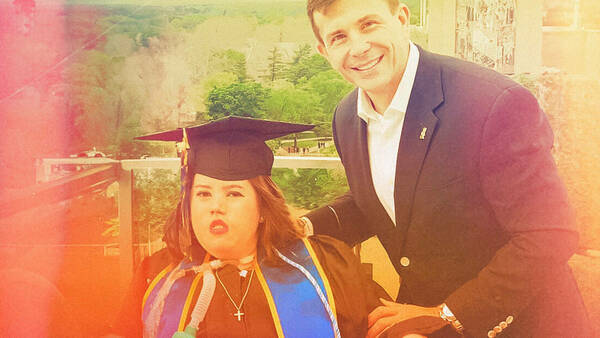Immediately after their honeymoon in 2007, Will McGrath ’02 and Ellen Block ’02 hopped on a plane to Lesotho, a small, landlocked African country that would become near and dear to their hearts. It would later be their home for a year. It would draw them back several times. And for each of them, it would be a place to learn and to give back.
For Ellen, a cultural anthropologist who studies HIV/AIDS and orphan care, Lesotho was at the junction of her research interests. The tiny nation has the second highest HIV prevalence rate in the world, and nearly 28 percent of children in Lesotho have lost one or both parents. For Will, time in Lesotho was a chance to immerse himself in a new culture and celebrate cultural differences through the written word.
While Will and Ellen each gave back to the community they encountered in Lesotho in different ways, both say the relationships they built proved formative.
Researcher Examines Lives of Vulnerable Children
After receiving her undergraduate degree in anthropology from Notre Dame, Ellen went on to complete a Ph.D. at the University of Michigan. Her graduate research drew her to Lesotho, and she became involved with Touching Tiny Lives, an organization dedicated to serving children in need by providing access to health care. The non-profit has numerous Notre Dame connections, she says. Founded by Ken Storen ’92, it had the early support of Dr. Dan Towle ’77, who started its U.S.-based foundation. In addition, she says, it attracted the support of the late Rev. Theodore M. Hesburgh, C.S.C. and has inspired many Notre Dame students to get involved.
“When I was looking to do my research, I thought that Lesotho would be a great place because it covers all the areas that I’m interested in, and it’s a very remote place that is understudied,” Ellen says. “It seemed like the organization was doing really good things, and I could follow them along and learn a lot about the context of the situation before gathering my own data.”
Touching Tiny Lives sponsors both an outreach program to bring food to vulnerable children in the community who are impacted by HIV/AIDS and a safe home that resembles an orphanage. In the home, the organization aims to find family members of orphaned children who will take them in.
“Living at the safe home, we would bond with the kids,” Ellen says. “We saw a lot of really sick kids, which is really hard. It’s miraculous and amazing when they are coming back to life, but we lost a bunch of kids that we had spent a lot of time with and that we really cared about. Touching Tiny Lives does a really amazing job of rehabilitating the kids, and for the most part we witnessed kids just blossom.”
Writer Shares Moments of Grace
While Ellen visited villages in an attempt to understand how families were coping with the AIDS crisis, Will taught at the local high school and honed his writing skills, an interest he held since his time as an English major at Notre Dame.
“I’ve always had a certain interest in bringing to light the stories of people who are on the fringes of our American consciousness,” Will says. “Once we got over to Lesotho and had been living there for a while, there’s just so many interesting people I’d met who had wonderful, beautiful, challenging yet hopeful lives they were living. It seemed like there were so many of those stories that were worth telling and worth celebrating.”
In November 2018, Will released Everything Lost Is Found Again, a memoir and essay collection blend that tells the stories of the two years he spent in Lesotho. He recounts instances of both pure joy and extreme sorrow, using his command of language to introduce readers to one of the least-known places in the world.
Readers experience the small, tender moments of grace that define the everyday lives of the people in Lesotho as well as the spiritual and intellectual growth that took place in Will and Ellen’s own lives.
“One of the interesting challenges I’ve found is that you don’t want to fall prey to the myths about Africa,” Will says. “It feels like in the West we have received wisdom about Africa as a place of suffering and tragedy. As a writer, it can be tricky sometimes to not fall into those cliches. You need to be aware of what you’re doing and have your eyes open because there is so much that is not tragedy and suffering that we both saw every day. We want to be able to celebrate the good work that’s being done and showcase the daily graceful acts of living that take place. It’s essential that we writers and scholars are careful in how we talk about this place.”
Grateful and Giving Back
Ellen and Will have continued to return to Lesotho throughout the years since their initial trip in 2007. On trips in 2013 and 2015, they brought along their two oldest children, Sam and Eve. And the relationships they built with the people of Lesotho continue to impact them.
The couple produced an ethnography on AIDS and orphaning, Infected Kin, which will be released in May 2019. Although traditionally ethnographies are written solely by anthropologists themselves, Will and Ellen’s will include stories and accounts about Lesotho in an effort to showcase what they call “the full human experience” of the people they’ve encountered.
Both say they are grateful for the opportunities they have had to give back to the people who changed their outlook for the better.
For Will, a nonfiction writer and freelance journalist, that opportunity came in part with the publication of Everything Lost Is Found Again. The book provided monetary aid to Touching Tiny Lives after his publisher, Dzanc Books, agreed to donate 15 percent of the proceeds directly to the organization.
“While there is no way for me to ever fully repay the people in Lesotho who spent time with me—both dear friends as well as strangers who told me stories about their lives—I felt strongly that my book should be able to do something tangible in Lesotho,” Will says. “So I was immensely grateful when my publisher agreed to donate directly to the Touching Tiny Lives safe home in Mokhotlong District, where we spent much time over the years. They do essential lifesaving work there each day, so any small way I could provide support to them felt necessary to me.”
For Ellen, an assistant professor of anthropology at the College of St. Benedict & St. John's University in Minnesota, her work with the board of Touching Tiny Lives Foundation provides her with an ongoing opportunity to make a difference.
“I have made my career off of the time, generosity, energy and stories of the people I work with in Lesotho,” Ellen says. “The main way I can direct my time and energy to giving back is through my work on the board, which is made up of a small group of volunteers in the U.S. whose sole purpose is to raise money and support the lifesaving work that Touching Tiny Lives does on the ground in Lesotho, serving orphans and vulnerable children in one of the most remote and rural districts in the country.”



